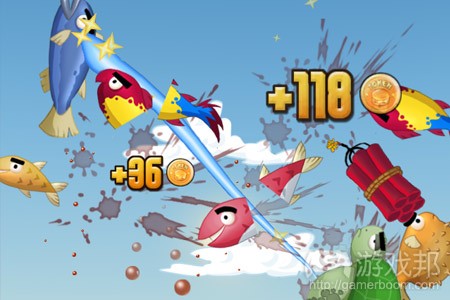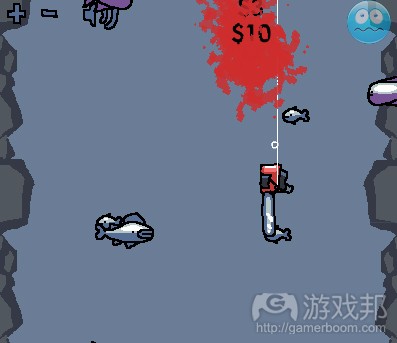从音乐翻唱现象看游戏设计的版权问题
作者:Andy Schatz
上周我去参加了一场Weezer的音乐会,他们演奏了《Pumped Up Kicks》这首我从没听过的歌曲。相关演奏视频链接如下:http://www.youtube.com/watch?v=sk-jhJ8cwr4。
这首歌曲听起来棒极了。今天早上这首歌曲仍旧留在我的脑海中。我找出了原版的曲目,链接为http://www.youtube.com/watch?v=SDTZ7iX4vTQ&ob=av3e。
原版的听起来也很棒。Weezer并没有具体说明原版音乐的名字,但是他们说是在收音机上听到这首歌曲,然后把它学了下来。
《Ninja Fishing》引发的争议
数周之前,Gamenauts公司发布了iPhone游戏《Ninja Fishing》。虽然这款游戏的艺术设计并不出众,但是核心游戏却非常独特且极具趣味性。随后,苹果推荐了这款游戏,它迅速便上升至榜单前10名,此刻公司可能正在收取大笔的盈利。
但是这款游戏真得是独特的原创游戏吗?当然不是,这款游戏是不甚出名的免费flash游戏《Radical Fishing》的克隆产品,后者于2010年末由Vlambeer发布。继《Radical Fishing》之后,Vlambeer又推出了《Super Crate Box》。但是从那之后,他们开始秘密将《Radical Fishing》改造成iOS游戏《Ridiculous Fishing》。新版的游戏拥有独特且非常漂亮的美术风格,在榜单上的上升速度很可能超过《Ninja Fishing》。
IGF总裁Brandon Boyer首先向众人公布《Ninja Fishing》的游戏设计灵感的来源。于是,许多开发者开始迅速响应。最终迫于压力,Gamenauts承认《Radical Fishing》是公司作品的灵感来源。
但是,这并没有让大家停止争论。众人的观点是,Gamenauts(游戏邦注:包括其他克隆游戏的公司)的做法会浇灭人们的创新热情。
那么这种说法是否正确呢?
音乐领域中的翻唱现象
假设美国超人气女歌手Katy Perry(游戏邦注:或者其他有着广大听众的演奏者)决定翻唱一首不甚出名、粗制滥造但很有趣的歌曲并把它放入自己的专辑中,而且她不知道这首曲子的原作者正在进行修改,正准备随后发布曲子的润色版本。
她当然可以这样做。她可以不顾版权来参考这首原创的曲子,或者她可以合法地翻唱原创歌曲。
只要获得了合法授权,她不需要经过他人同意就可以翻唱这首曲子,而该歌曲首个版本的发布则取决于原创者的选择。《Ridiculous Fishing》这个例子的情况是,原版本已经先于盗版游戏面世。
《Desktop Dungeons》的iOS克隆游戏问题
《Desktop Dungeons》是款免费的PC游戏,在原创开发者发布游戏之前iOS市场上就出现了克隆品。但是,这个案例也有不同之处:克隆者获得了内测的权利,在《Desktop Dungeons》对外
公开之前便开始克隆游戏。如果游戏设计是受版权法而非专利法保护,那么《Desktop Dungeons》的开发团队原本应该等到万事俱备时再公开发布游戏,以防止衍生克隆产品。
游戏克隆与歌曲翻唱的联系
我想Vlambeer之所以会感到恼怒的原因是,Gamenauts盗走的是《Radical Fishing》的大部分游戏设计,而业内其他人一般都不会留下如此明显的模仿痕迹。我猜测如果人们克隆的是该公司的其他产品,例如《Super Crate Box》这个不甚出色的游戏设计,可能他们就不会如此愤怒了。我不认为公开指责翻唱行为是件好事,也不认为Gamenauts的做法应该遭到公众的责难。游戏就是娱乐,我们都像RIAA(美国唱片工业协会)那样采取过度的保护措施,公众可能就不会站在原创作者的一边了。
而且,《Ninja Fishing》确实有创新之处。游戏的美术风格有所不同,比原来的《Radical Fishing》更贴近大众市场(游戏邦注:作者认为原作品看起来较差),而且游戏中还有一个从《水果忍者》及其他iOS游戏中撷取的切割机制。尽管这些创新较小,但也确实属于技术性的创新。
专利法并不能保护游戏创意
目前,游戏设计受专利法保护,这就意味着游戏设计更多被视为制作过程而非艺术创作过程。这就意味着,你可以为个人创作的机制申请专利,但这当然会浇灭市场的创造激情。
很显然,游戏设计更像是音乐作曲而非机制创新。我们的法律应该考虑到这个方面。这是什么意思呢?应该允许开发者借鉴其他游戏(游戏邦注:即复制其他人的个别机制)。同时也允许完全克隆其他游戏(游戏邦注:就像翻唱整首歌曲),但是要为原创作者提供某些保护措施和经济上的奖励。
那么,法律应该如何区别对待游戏设计克隆和音乐克隆呢?
这两者主要的不同之处有以下几点:
1、翻唱歌曲显然比克隆游戏更为简单。
2、游戏行业就构建在微克隆的基础之上。游戏领域中的多数创新通常都是对原先事物做些许修改。
3、音乐行业中的对翻唱提出的“不可改变基本韵律或作品基本特征”的要求并不适合游戏。
在没有版权保护的情况下,游戏设计师应当采取何种做法呢?
1、对外公布游戏设计灵感
2、向公众说明其他游戏背后的灵感来源
3、保持积极性
我对《Ridiculous Fishing》开发团队遭受的不幸深感同情,因为他们发现自己的游戏还未进驻市场时便已被克隆产品捷足先登。我确实认为他们的创意灵感应该得到法律的保护。但是,我们也应该为那些克隆者提供合法的生存空间,让他们有开始学习并进行创新的机会。(本文为游戏邦/gamerboom.com编译,如需转载请联系:游戏邦)
Fishing, the iOS Clone market, and Patent/Copyright
Andy Schatz
Last week I went to a Weezer concert, they covered a song I’d never heard before: “Pumped Up Kicks”. Here’s the performance: http://www.youtube.com/watch?v=sk-jhJ8cwr4.
It was awesome. This morning I couldn’t get the song out of my head. I went and looked up the original: http://www.youtube.com/watch?v=SDTZ7iX4vTQ&ob=av3e.
Also awesome (and apparently pretty popular, I’m just out of the loop). Weezer didn’t specifically say the name of the original band but they did say it was a cover of a song that they heard on the radio that morning and decided to learn.
Enter the Ninja
A few weeks ago, a company called Gamenauts released an iPhone game called Ninja Fishing. While it has a bland art style, the core game is unique, interesting, and fun. Apple then featured the game, and it quickly rose to the top 10 list, and they are likely raking in profits at this very moment.
NOT SO FAST. “Unique”? “Original”? No, the game was a clone of a not so well known free flash game called Radical Fishing, released by Vlambeer at the end of 2010.
After Radical Fishing, Vlambeer went on to make Super Crate Box. And after that, they began working in secret on an iOS remake of Radical Fishing called Ridiculous Fishing. The new RF has a unique and beautiful art style, and likely would have climbed the charts even faster than Ninja Fishing. It may still.
IGF chair Brandon Boyer led the charge on educating the masses about the origin of Ninja Fishing’s game design inspiration. A number of developers quickly picked up their pitchforks, and under pressure, Gamenauts offered to credit Radical Fishing as the inspiration behind their work.
But this didn’t silence their detractors. The argument against Gamenauts (and other cloners) is that it chills the incentive for innovation.
But does it?
Katy Perry covers The Pixies
Imagine that Katy Perry (or some equally broad audience but bland performer) had decided to cover a not-well-known and poorly produced but interesting song from a small band and put it on her album, not knowing that the small band had formed an offshoot band with more production values, which had intended to release a cleaned up version of the song at a later date.
She is actually allowed to do this. She could either sample the original track without copyright or credit or she could go through one of 3 processes for legally covering the original song: http://en.wikipedia.org/wiki/Cover_version#U.S._copyright_law
She doesn’t even need to have permission to cover the song if she gets a mechanical license (cheap, easy to get, but has a standard royalty rate attached to it), although the original band is allowed to choose who will release the first version of a song if it hasn’t been released yet. In the case of Ridiculous Fishing, the original version has already been released.
The Desktop Dungeons iOS Clone, and Copyright vs Patents
Desktop Dungeons is another free-to-play (and AWESOME) PC game that got cloned in the iOS market before the original creators were able to port the game. There’s one major difference here, though: the cloner had access to a private beta, and began cloning the game before the original Desktop Dungeons was ever released to the public. If game design were covered by Copyright law, rather than patent law, then the team responsible for Desktop Dungeons could have prevented the release of the clone simply by not releasing Desktop Dungeons publicly until they were prepared to hit all markets.
The Game Industry was built on the back of slightly edited cover songs
I think the reason that it’s so maddening for the Vlambeer folks (understandably so) is because they took a fairly major game design leap with Radical Fishing, while the rest of the industry tends to take much smaller ones. I’m guessing this wouldn’t be so maddening if someone had cloned their other title, Super Crate Box, as the game design leap to get there wasn’t as great. That said, I don’t think public shaming of a cover band is a good thing, nor do I think public shaming of Gamenauts is either. Games are about entertainment, and the public won’t be on the side of the original creators if we act over-protective of our works like the RIAA.
Additionally, Ninja Fishing actually did include some innovations: the art style is different, and more mass market than the original Radical Fishing (which looks… ahem… shitty), and they included a slicing mechanic (which is lifted from Fruit Ninja and a number of other iOS games). These are small, but they are technically “innovations”.
Game Design Patents are bullshit
Currently, game design is covered by Patent law, meaning that game design is viewed more as a mechanical process rather than an artistic one. This means that you can potentially patent individual mechanics, which certainly chills the market for creative inspiration.
Here’s a recent bullshit Nintendo patent
Here’s a bullshit Microsoft patent
It seems pretty clear that game design has a lot more in common with music composition and not mechanical innovation. Our laws should treat it this way. What does this mean? Sampling (copying individual mechanics) should be OK*. Outright cloning (covering a whole song) should also be OK, but some protections and financial incentive should go towards the original creators.
*(The legality of sampling in the music world is actually still being hashed out, but most likely the law will eventually come down against the samplers. I believe this is the wrong approach, and that sampling should be legal in music AND game mechanics.)
How should the law treat game design cloning differently from music cloning?
The major differences are these:
It’s WAAAY easier to cover a song than to clone a game. Thus the disincentive for cloning may be too great, whereas it’s small enough in the music industry to provide incentive on both sides.
The game industry is built on the backs of slightly modified clones. Most of the innovations in the gaming world are basically bands changing a single verse or even line from someone else’s song.
A mechanical license (cover license not requiring permission) requires that the cover “arrangement shall not change the basic melody or fundamental character of the work”. This doesn’t work for games.
In the absence of copyright protection, what should game designers do?
ALWAYS CREDIT YOUR GAME DESIGN INSPIRATIONS
Educate the public on the inspirations behind other games.
Stay positive
I feel bad for the team making Ridiculous Fishing, especially if they find that their market has been sapped by the time their game gets to market. I do think that they should have some legal protections for their creative inspiration. But we also have to provide a legal and non-shameful avenue for the cloners (cover bands) to exist and to take the creative baby steps that have formed the basis of much of the innovation in our nascent art-form. (Source: Gamasutra)
上一篇:论游戏设计中的映像情绪和原始情绪









































 闽公网安备35020302001549号
闽公网安备35020302001549号